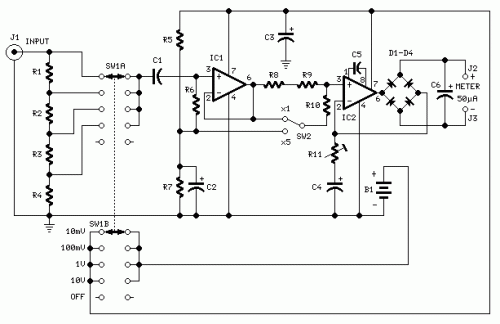873
FREE
circuits!
FREE
circuits!
How to build Precision Audio Millivoltmeter
December 12, 2010 - category: Current and voltageMeasures 10mV to 50Volt RMS in eight ranges
Simply connect to your Avo-meter set @ 50uA range
Circuit diagram
Parts:
- R1 909K 1/2Watt 1% Metal Oxide Resistor
- R2 90K9 1/2Watt 1% Metal Oxide Resistor
- R3 9K09 1/2Watt 1% Metal Oxide Resistor
- R4 1K01 1/2Watt 1% Metal Oxide Resistor
- R5 100K 1/4W Resistor
- R6 2M2 1/4W Resistor
- R7 82K 1/4W Resistor
- R8 12K 1/4W Resistor
- R9 1K2 1/4W Resistor
- R10 3K3 1/4W Resistor
- R11 200R 1/2W Trimmer Cermet
- C1 330nF 63V Polyester Capacitor
- C2,C3 100uF 25V Electrolytic Capacitor
- C4 220uF 25V Electrolytic Capacitor
- C5 33pF 63V Polystyrene Capacitor
- C6 2u2 63V Electrolytic Capacitor
- D1-D4 1N4148 75V 150mA Diodes
- IC1 CA3140 Op-amp
- IC2 CA3130 Op-amp
- SW1 2 poles 5 ways rotary switch
- SW2 SPDT switch
- J1 RCA audio input socket
- J2,J3 4mm. output sockets
- B1 9V PP3 Battery
- Clip for PP3 Battery
Notes:
- Connect J2 and J3 to an Avo-meter set @ 50uA range
- Switching SW2 the four input ranges can be multiplied by 5
- Total fsd ranges are: 10mV, 50mV, 100mV, 500mV, 1V, 5V, 10V, 50V
- Set R11 to read 1V in the 1V range, with a sinewave input of 1V @ 1KHz
- Compare the reading with that of another known precision Millivoltmeter or with an The oscilloscope reading must be a sinewave of 2.828V peak to peak amplitude
- Frequency response is flat in the 20Hz-20KHz range
- If you have difficulties in finding resistor values for R1, R2, R3 & R4, you can use the following trick:
- R1 = 10M + 1M in parallel
- R2 = 1M + 100K in parallel
- R3 = 100K + 10K in parallel
- R4 = 1K2 + 6K8 in parallel
- All resistors 1% tolerance
author: RED Free Circuit Designs
circuit from http://www.redcircuits.com/



 This category
This category